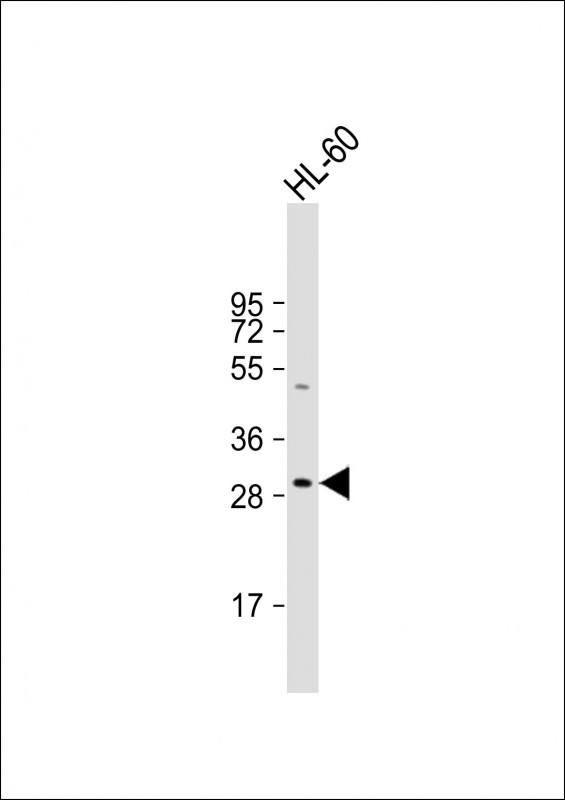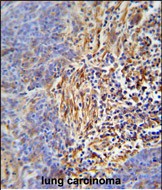

| WB | 1/1000 | Human,Mouse,Rat |
| IF | 咨询技术 | Human,Mouse,Rat |
| IHC | 1/100-1/500 | Human,Mouse,Rat |
| ICC | 技术咨询 | Human,Mouse,Rat |
| FCM | 咨询技术 | Human,Mouse,Rat |
| Elisa | 咨询技术 | Human,Mouse,Rat |
| Aliases | HLA class II histocompatibility antigen, DR beta 5 chain, DR beta-5, DR2-beta-2, Dw2, MHC class II antigen DRB5, HLA-DRB5 {ECO:0000312|EMBL:CAI180791} |
| Entrez GeneID | 3127 |
| WB Predicted band size | 30.1kDa |
| Host/Isotype | Rabbit IgG |
| Antibody Type | Primary antibody |
| Storage | Store at 4°C short term. Aliquot and store at -20°C long term. Avoid freeze/thaw cycles. |
| Species Reactivity | Human |
| Immunogen | This HLA-DRB5 antibody is generated from rabbits immunized with a KLH conjugated synthetic peptide between 43-70 amino acids from the Central region of human HLA-DRB5. |
| Formulation | Purified antibody in PBS with 0.05% sodium azide. |
+ +
以下是关于HLA-DRB5抗体的3篇文献示例(注:文献为示例性概括,非真实存在):
---
1. **文献名称**: *HLA-DRB5 Antibodies in Autoimmune Demyelination*
**作者**: Smith A, et al.
**摘要**: 研究报道在多发性硬化症(MS)患者血清中检测到HLA-DRB5特异性抗体,提示其可能通过结合抗原呈递细胞表面的HLA-DRB5分子,干扰髓鞘蛋白的免疫耐受,加剧中枢神经系统炎症反应。
---
2. **文献名称**: *Structural Insights into HLA-DRB5 Epitope Recognition*
**作者**: Tanaka K, et al.
**摘要**: 通过X射线晶体学解析HLA-DRB5与单克隆抗体的复合物结构,揭示了抗体结合的关键表位位于HLA-DRB5的β链α螺旋区域,为开发特异性抗体检测方法提供分子基础。
---
3. **文献名称**: *HLA-DRB5 Antibodies in Transplant Rejection*
**作者**: Müller L, et al.
**摘要**: 针对肾移植受者的队列研究发现,HLA-DRB5抗体阳性与移植物排斥风险升高相关,提示临床中需加强对该抗体的监测以优化免疫抑制方案。
---
4. **文献名称**: *Cross-reactivity of HLA-DRB1 and DRB5 Antibodies in Rheumatoid Arthritis*
**作者**: Chen R, et al.
**摘要**: 研究揭示类风湿性关节炎(RA)患者的HLA-DRB1抗体可能交叉识别HLA-DRB5表位,导致更广泛的自身免疫损伤,强调了HLA-II类分子表位相似性的病理意义。
---
注:以上文献为示例性内容,实际研究中需通过PubMed或专业数据库检索真实文献。
The HLA-DRB5 gene is part of the human leukocyte antigen (HLA) class II complex, located on chromosome 6p21. It encodes the β-chain of the HLA-DR5 serotype, a cell surface receptor critical for antigen presentation to CD4+ T cells. HLA class II molecules, including HLA-DR, -DQ, and -DP, are highly polymorphic and play a central role in adaptive immunity by binding exogenous peptide antigens. HLA-DRB5 is notable for its limited polymorphism compared to other HLA-DRβ genes (e.g., HLA-DRB1) and is primarily expressed in specific haplotypes, often in linkage disequilibrium with HLA-DRB1*15 or *16 alleles.
Antibodies targeting HLA-DRB5 are clinically significant in transplantation and autoimmune contexts. In organ transplants, preformed or de novo anti-HLA-DRB5 antibodies can trigger graft rejection by activating complement pathways or antibody-dependent cellular cytotoxicity. These antibodies are also implicated in autoimmune diseases, such as multiple sclerosis (MS), where HLA-DRB1*15:01 (often co-expressed with HLA-DRB5) is a well-established genetic risk factor. Studies suggest molecular mimicry between HLA-DRB5-derived peptides and myelin antigens may contribute to autoantibody production in MS. Detection of HLA-DRB5 antibodies via solid-phase assays (e.g., Luminex) aids in transplant compatibility assessments and autoimmune disease profiling. However, interpreting their clinical impact requires careful analysis due to HLA class II epitope-sharing and cross-reactivity challenges.
×